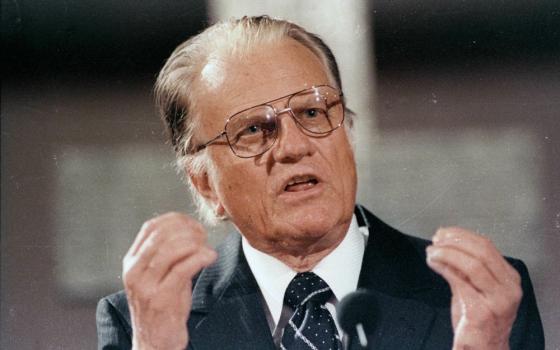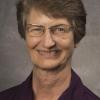Today, I celebrate the life and death of the Rev. Billy Graham. He touched my life, and his organization taught me real-life lessons in ecumenism.
It was 1973, and I had recently received my master's degree in theology from the University of Notre Dame. St. Louis was celebrating "Key '73," in which various Protestant and Catholic groups came together to pray for our city.
Our congregation was invited to have sisters prepared to call Catholics who would come forward during the Billy Graham crusade.
Prior to the crusade, I offered to be a "counselor," someone who would meet those who came forward when Graham made the "altar call." To be a counselor, one had to attend a six-week course training us in appropriate responses to those who might come forward. At the end of the course, we had to take a written test.
When I came to the group after having taken the test, Victor Nelson, one of the organizers of the event, asked to see me. I remember this very kind gentleman asking me to sit down at his desk, and he told me I had failed the test. He could see the shock registered in my face and he went on to explain.
"Sister, we sometimes find that with Catholics there is a major difference in theology that only surfaces at the 'altar call.' The question we asked on the test, as you recall, was: 'How do you respond to someone who comes forward? What are your first words to him/her?' And your response was: 'God has forgiven you. Welcome to a new relationship with Christ.' Our Protestant theology begins to instruct the person by saying, 'God so loved the world that he sent his only begotten son' (John 3:16), and so we stress God's love for the person — that's the way we welcome someone at the altar call."
This conversation was a graced moment for me as I recognized my Catholic guilt, so deeply engrained in years of Catholic education.
Recognizing the face of God's love, regardless of religious affiliation, continues to deepen for me even as I write this.
The day of the crusade arrived and — having learned this important lesson — I was able to be a counselor. The crusade confirmed me my awe of Graham's way of evangelism.
Each person who came forward was invited to fill out a short postcard with their name and address, and the name/address of their church/parish, with the understanding that the information would be kept by the Billy Graham crusade staff and also sent to the parish/church they had named. The hope was that a local pastor, whether Catholic or Protestant, would follow up with the person who had come forward, inviting them into conversation and deepening of their graced experience.
About two weeks after the crusade, 12 School Sisters of Notre Dame were invited to be part of the follow-up to call more than 600 adults and children who had written Catholic parishes on the cards.
The crusade office rented a bank of telephones, and we followed a "script" that said something like: "Hello, I'm Judy and I realize you came forward recently at the Billy Graham crusade. I'm just wondering if you'd like to share anything about the experience."
In one interview, I remember a Catholic man asking if he had to go to confession because of attending the crusade. When I shared that I was a Catholic sister, he began crying on the phone, filled with joy and relief.
I also asked if any priest or minister had contacted the individuals since the crusade, knowing that the postcards had been sent to the respective parishes. Not once had anyone from the Catholic community reached out to those with whom I spoke.
As I continued to learn from the Billy Graham crusade staff, I asked if we could do something for them. They asked if we would tell them more about the Eucharist. We invited a Jesuit priest, Fr. Don Reck, to meet with about 15 crusade staff and went through a "dry-Mass," explaining the Eucharist to interested Baptist ministers and others.
A lovely British staff person asked if I would offer her a "directed retreat" and I still remember the blessings that she shared with me. One example stands out. I invited her to pray over Isaiah 55: "As the rain and the snow come down from the heavens, watering the Earth and providing seed for the sower and bread for the eating, so my word will not return to me empty without succeeding in what it was sent to do."
She was deeply moved by this word and felt that our coming together, Protestant and Catholic, after centuries of heartache and cruelty, was a fulfillment of this word, and our community needed to deepen.
One final memory that impressed me was that Nelson invited me to fly to Minneapolis and tour the international headquarters of the Billy Graham Evangelistic Association.
This is what stands out as I remember that one-day trip in 1973.
I was shown into the offices where letters were received. Over each desk was a camera. As the staff person opened the letter with a letter-opener, the person held up the enclosed letter and/or check to be photographed. This simple technology made me respect even more the transparency of the organization in its multimillion-dollar business transactions.
As I was led into another area, there was a small chapel, where staff persons were holding a letter in one hand and a Bible in the other. When someone wrote asking for guidance, encouragement or prayer, a person who loved Scripture would pray over that letter and then handwrite a response to the individual, citing chapter and verse that God had given them in praying for the specific need of the individual.
Today, I recognize my deep regard for Graham. He built an organization based on evangelism that did not pit one religious body against another, but tried to follow Christ in providing love, understanding and community.
He was a true American, grounded in the word of God, who played his role in building an inclusive community. I feel blessed to have been "educated" by him in the true meaning of the "beloved community."
[Judith Best is a School Sister of Notre Dame and coordinator of SturdyRoots.org. She gives presentations on the heritage of the School Sisters of Notre Dame and is also exploring evolution as the bridge between science and religion.]

